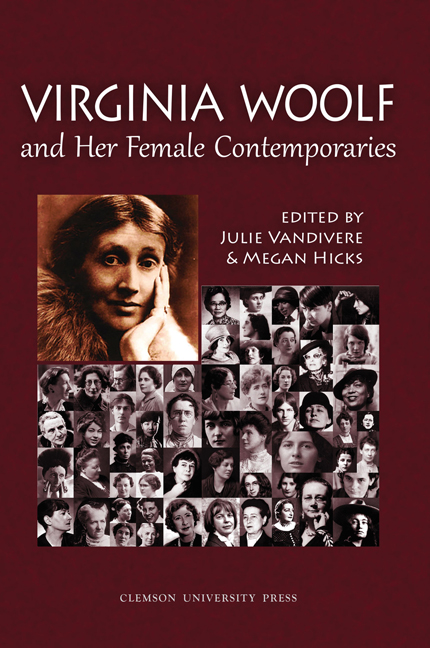Book contents
- Frontmatter
- Table of Contents
- Introduction
- Acknowledgments
- Abbreviations
- Who Are Virginia Woolf's Female Contemporaries?
- Virginia Woolf's Cultural Contexts
- Virginia Woolf's Contemporaries Abroad
- Reconfiguring the Mermaid: HD, Virginia Woolf, and the Radical Ethics of Writing as Marine Practice
- A Carnival of the Grotesque: Feminine Imperial Flânerie in Virginia Woolf 's “Street Haunting” and Una Marson's “Little Brown Girl”
- Mad Women: Dance, Female Sexuality, and Surveillance in the Work of Virginia Woolf and Emily Holmes Coleman
- Shop My Closet: Virginia Woolf, Marianne Moore, and Fashion Contemporaries
- Virginia Woolf and Victoria Ocampo: A Brazilian Perspective
- Making Waves in Lonely Parallel: Evelyn Scott and Virginia Woolf
- Critical Characters in Search of an Author: Cornelia Sorabji and Virginia Woolf
- “In my mind I saw my mother”: Virginia Woolf, Zitkala-Ša, and Autobiography
- Virginia Woolf's Contemporaries at Home
- Tribute to Jane Marcus
- Notes on Contributors
- Conference Program 223
A Carnival of the Grotesque: Feminine Imperial Flânerie in Virginia Woolf 's “Street Haunting” and Una Marson's “Little Brown Girl”
from Virginia Woolf's Contemporaries Abroad
- Frontmatter
- Table of Contents
- Introduction
- Acknowledgments
- Abbreviations
- Who Are Virginia Woolf's Female Contemporaries?
- Virginia Woolf's Cultural Contexts
- Virginia Woolf's Contemporaries Abroad
- Reconfiguring the Mermaid: HD, Virginia Woolf, and the Radical Ethics of Writing as Marine Practice
- A Carnival of the Grotesque: Feminine Imperial Flânerie in Virginia Woolf 's “Street Haunting” and Una Marson's “Little Brown Girl”
- Mad Women: Dance, Female Sexuality, and Surveillance in the Work of Virginia Woolf and Emily Holmes Coleman
- Shop My Closet: Virginia Woolf, Marianne Moore, and Fashion Contemporaries
- Virginia Woolf and Victoria Ocampo: A Brazilian Perspective
- Making Waves in Lonely Parallel: Evelyn Scott and Virginia Woolf
- Critical Characters in Search of an Author: Cornelia Sorabji and Virginia Woolf
- “In my mind I saw my mother”: Virginia Woolf, Zitkala-Ša, and Autobiography
- Virginia Woolf's Contemporaries at Home
- Tribute to Jane Marcus
- Notes on Contributors
- Conference Program 223
Summary
Virginia Woolf has come to be known, among other things, for her portraits of the modern mind in urban transit. Indeed, the figure of the flâneur, the nineteenthcentury man-at-leisure described by Walter Benjamin as a distinctly modern figure who walks the streets to survey the urban landscape from a purely observational perspective, emerges as a specific trope in many moments of Woolf 's fiction, as seen in the characters of Peter Walsh of Mrs. Dalloway (1925) or his later counterpart, Martin Pargiter, in The Years (1937). Female flâneuses likewise stalk the fictive landscapes of her fiction and essays, perhaps most notably Clarissa Dalloway in Mrs. Dalloway, but also the anonymous narrator of A Room of One's Own (1929), or even the historical flâneuse heroine of Orlando (1928). The figure of the flâneuse, or the female version of the traditionally male street-walker, the flâneur, has herself also been the subject of several studies in feminist approaches to modernist literature by scholars like Deborah Parsons or Janet Wolff, who argue in different ways regarding the viability of such a category as a way to interrogate “a particular mode of female urban vision” (Parsons 6). Interestingly, within the sidelong views of imperial British life cast by other flâneur or flâneuse-like narrators in the works of Virginia Woolf and her female contemporaries, including Una Marson, Katherine Mansfield, and Jean Rhys, appear a surprisingly frequent crop of marginalized female characters, their appearance often bordering on the grotesque: widows, abandoned women, immigrant transplants, chorus girls, West Indian servants, and even masked walkers of the carnival. These figures frequently disrupt aspirationally authoritative narratives of the imperial everyday with their unexpected, often wildly anarchic, presence. Looking specifically at Woolf and Marson, two writers who most explicitly deploy the flâneurial perspective, I argue in this paper that the insistent presence of similarly marginal figures, often foreign, often abject, within the perspective of the flâneur-, or, more often, flâneuse-like, narrators in the works of these female modernists constitutes part of a larger self-reflexive commentary generated by such authors on the precarious status of British women writers as newly arrived observers, urban or otherwise, within a patriarchal imperial complex.
- Type
- Chapter
- Information
- Virginia Woolf and Her Female Contemporaries , pp. 102 - 108Publisher: Liverpool University PressPrint publication year: 2016



